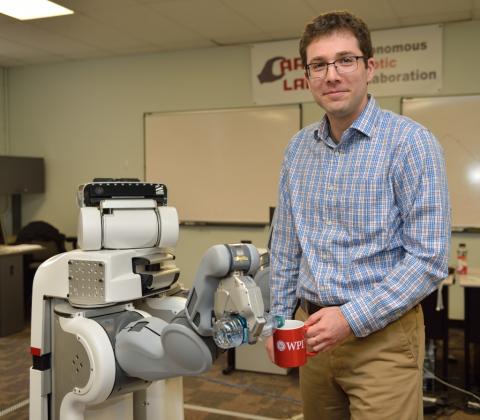event
IRIM Robotics Seminar–Dmitry Berenson
Primary tabs
Worcester Polytechnic Institute’s Dmitry Berenson presents “Transformations and Frontiers in Robot Motion and Manipulation” as part of the IRIM Robotics Seminar Series. The event will be held in the TSRB Banquet Hall from 12-1 p.m. and is open to the public.
Abstract
Robotics is undergoing three transformations, which are changing our research focus and opening doors to new applications. The need for robotic manipulation in unstructured environments, human-robot collaborative systems, and handling soft materials is transforming the fundamental assumptions underlying our methods for manipulation planning and creating new opportunities for applications in service robotics, health care, and manufacturing. I will present our contributions to these transformations, which include new algorithms that plan motion with multiple simultaneous constraints, manage sensor uncertainty in the planning process, model human motion in collaborative settings, and control manipulation of soft objects. I will discuss the theory behind these approaches and show practical applications on real-world robots. I will end by identifying three frontiers that are emerging as a result of these transformations as well as prospects for their exploration.
Bio
Dmitry Berenson received a B.S. in Electrical and Computer Engineering from Cornell University in 2005, where he started his robotics work in Hod Lipson's lab. He went on to graduate from the Ph.D. program at the Robotics Institute at Carnegie Mellon University (CMU) in 2011, where his advisors were Siddhartha Srinivasa and James Kuffner. While at CMU, Berenson worked in the Personal Robotics Lab and completed internships at the Digital Human Research Center in Japan, Intel Labs in Pittsburgh, and LAAS-CNRS in France.
In 2012, Berenson completed a post-doc at UC Berkeley, working with Ken Goldberg and Pieter Abbeel. In August 2012, he joined the WPI faculty as an assistant professor in the Robotics Engineering Program and Computer Science Department where he founded the Autonomous Robotic Collaboration (ARC) Lab, which focuses on motion planning, manipulation, and human-robot collaboration. His research focuses on creating algorithms that allow robots to interact with the world and collaborate efficiently with people. These general-purpose motion planning and manipulation algorithms can be applied to robots that work in homes, factories, and operating rooms.
Status
- Workflow Status:Published
- Created By:Josie Giles
- Created:01/05/2015
- Modified By:Fletcher Moore
- Modified:04/13/2017
Categories
Keywords
Target Audience

